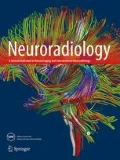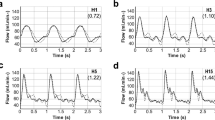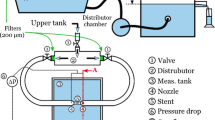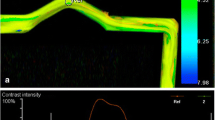Abstract
Introduction
Hemodynamic modification by means of flow diversion is increasingly used for treatment of intracranial aneurysms. Despite of promising results, there is still a paucity of methods to reliably predict long-term success of this technique. Laser Doppler anemometry (LDA) can be used to quantify the influence of stents on intra-aneurysmal flow in vitro.
Methods
All experiments were performed with a pulsatile model of a sidewall aneurysm. A physiologic flow was created with a circulatory experimental setup, and a transparent non-Newtonian glycerol–water solution was used to substitute human blood. Flow velocity was measured with a one-component LDA system, recording flow components parallel and perpendicular to the parent vessel. Three different stents (Solitaire, Silk, Phenox flow diverter) were deployed over the aneurysm neck, respectively.
Results
Flow reduction was 67.59% (inflow zone), 9.65% (dome) and 37.94% (outflow zone) by the Solitaire stent. The Silk stent reduced the flow by 58.15% (inflow zone), 89.06% (dome) and 90.06% (outflow zone). The Phenox flow diverter reduced the flow by 96.76% (inflow zone), 90% (dome) and 90.91% (outflow zone) when positioned with narrow stent struts but increased the velocity of up to seven times compared to the unstented model when placed with loose strut packing in the proximal part of the aneurysm.
Conclusion
LDA is a feasible method to quantify intra-aneurysmal flow and flow reduction efficacy of stents in vitro. Flow reduction was negligible with a standard self-expanding stent. For dedicated flow diverters, it depended both on stent design and on appropriate positioning.







Similar content being viewed by others
References
Ahlhelm F, Roth C, Kaufmann R, Schulte-Altedorneburg G, Romeike BF, Reith W (2007) Treatment of wide-necked intracranial a-neurysms with a novel self-expanding two-zonal endovascular stent device. Neuroradiology 49(12):1023–1028
Kallmes DF, Ding YH, Dai D, Kadirvel R, Lewis DA (2007) Cloft HJ.A new endoluminal, flow-disrupting device for treatment of saccular aneurysms. Stroke 38(8):2346–2352
Vanninen R, Manninen H, Ronkainen A (2003) Broad-based intracranial aneurysms: thrombosis induced by stent placement. AJNR Am J Neuroradiol 24(2):263–266
Pumar JM, Lete I, Pardo MI, Vázquez-Herrero F, Blanco M (2008) LEO stent monotherapy for the endovascular reconstruction of fusiform aneurysms of the middle cerebral artery. AJNR Am J Neuroradiol 29(9):1775–1776
Lylyk P, Miranda C, Ceratto R, Ferrario A, Scrivano E, Luna HR, Berez AL, Tran Q, Nelson PK, Fiorella D (2009) Curative endovascular reconstruction of cerebral aneurysms with the pipeline embolization device: the Buenos Aires experience. Neurosurgery 64(4):632–642
Liepsch D, Moravec S, Baumgart R (1992) Some flow visualization and laser-Doppler-velocity measurements in a true-to-scale elastic model of a human aortic arch—a new model technique. Biorheology 29(5–6):563–580
Gobin YP, Counord JL, Flaud P, Duffaux J (1994) In vitro study of haemodynamics in a giant saccular aneurysm model; influence of flow dynamics in the parent vessel and effects of coil embolisation. Neuroradiology 36(7):530–536
Graves VB, Strother CM, Partington CR, Rappe A (1992) Flow dynamics of lateral carotid artery aneurysms and their effects on coils and balloons: an experimental study in dogs. AJNR Am J Neuroradiol 13(1):189–196
Strother CM, Graves VB, Rappe A (1992) Aneurysm hemodynamics: an experimental study. AJNR Am J Neuroradiol 13(4):1089–1095
Steiger HJ, Perktold K (1997) Computer modeling of intracranial saccular and lateral aneurysms for the study of their hemodynamics. Neurosurgery 41(1):326–327
Sadasivan C, Cesar L, Seong J, Rakian A, Hao Q, Tio FO, Wakhloo AK, Lieber BB (2009) An original flow diversion device for the treatment of intracranial aneurysms: evaluation in the rabbit elastase-induced model. Stroke 40(3):952–958
Seong J, Wakhloo AK, Lieber BB (2007) In vitro evaluation of flow divertors in an elastase-induced saccular aneurysm model in rabbit. J Biomech Eng 129(6):863–872
Lieber BB, Livescu V, Hopkins LN, Wakhloo AK (2002) Particle image velocimetry assessment of stent design influence on intra-aneurysmal flow. Ann Biomed Eng 30(6):768–777
Ford MD, Nikolov HN, Milner JS, Lownie SP, Demont EM, Kalata W, Loth F, Holdsworth DW, Steinman DA (2008) PIV-measured versus CFD-predicted flow dynamics in anatomically realistic cerebral aneurysm models. J Biomech Eng 130(2):021015
Trager AL, Sadasivan C, Seong J, Lieber BB (2009) Correlation between angiographic and particle image velocimetry quantifications of flow diverters in an in vitro model of elastase-induced rabbit aneurysms. J Biomech Eng 131(3):034506
Augsburger L, Farhat M, Reymond P, Fonck E, Kulcsar Z, Stergiopulos N, Rüfenacht DA (2009) Effect of flow diverter porosity on intraaneurysmal blood flow. Klin Neuroradiol 19(3):204–214
Shojima M, Oshima M, Takagi K et al (2004) Magnitude and role of wall shear stress on cerebral aneurysm: computational fluid dynamic study of 20 middle cerebral artery aneurysms. Stroke 35(11):2500–2505
Steinman DA, Milner JS, Norley CJ, Lownie SP, Holdsworth DW (2003) Image-based computational simulation of flow dynamics in a giant intracranial aneurysm. AJNR Am J Neuroradiol 24(4):559–566
Bousel L, Rayz V, McCulloch C et al (2008) Aneurysm growth occurs at region of low wall shear stress: patient-specific correlation of hemodynamics and growth in a longitudinal study. Stroke 39(11):2997–3002
Castro MA, Putman CM, Cebral JR (2006) Computational fluid dynamics modeling of intracranial aneurysms: effects of parent artery segmentation on intra-aneurysmal hemodynamics. AJNR Am J Neuroradiol 27(8):1703–1709
Cebral JR, Castro MA, Appanaboyina S, Putman CM, Millan D, Frangi A (2005) Efficient pipeline for image-based patient-specific analysis of cerebral aneurysm hemodynamics: technique and sensitivity. IEEE Trans Med Imaging 24(4):457–467
Cebral JR, Castro MA, Burgess JE, Pergolizzi RS, Sheridan MJ, Putman CM (2005) Characterization of cerebral aneurysms for assessing risk of rupture by using patient-specific computational hemodynamics models. Am J Neuroradiol 26(10):2550–2559
Mantha A, Karmonik C, Benndorf G, Strother C, Metcalfe R (2006) Hemodynamics in a cerebral artery before and after the formation of an aneurysm. AJNR Am J Neuroradiol 27(5):1113–1118
Benndorf G, Ionescu M (2009) Y Alvarado MV, Hipp J, Metcalfe R. Wall shear stress in intracranial self-expanding stents studied using ultra-high-resolution 3D reconstructions. AJNR Am J Neuroradiol 30(3):479–486
Larrabide I, Radaelli A, Frangi A (2008) Fast virtual stenting with deformable meshes: application to intracranial aneurysms. Med Image Comput Comput Assist Interv 11(Pt 2):790–797
Ohta M, Wetzel SG, Dantan P, Bachelet C, Lovblad KO, Yilmaz H, Flaud P, Rüfenacht DA (2005) Rheological changes after stenting of an cerebral aneurysm: a finite element modeling approach. Cardiovasc Intervent Radiol 28(6):768–772
Hirabayashi M, Ohta M, Rüfenacht DA, Chopard B (2003) Characterization of flow reduction properties in an aneurysm due to a stent. Phys Rev E Stat Nonlin Soft Matter Phys 68(2 Pt 1):021918
Conflict of Interest Statement
We declare that we have no conflict of interest.
Author information
Authors and Affiliations
Corresponding author
Rights and permissions
About this article
Cite this article
Dorn, F., Niedermeyer, F., Balasso, A. et al. The effect of stents on intra-aneurysmal hemodynamics: in vitro evaluation of a pulsatile sidewall aneurysm using laser Doppler anemometry. Neuroradiology 53, 267–272 (2011). https://doi.org/10.1007/s00234-010-0723-4
Received:
Accepted:
Published:
Issue Date:
DOI: https://doi.org/10.1007/s00234-010-0723-4




